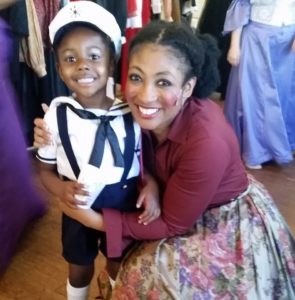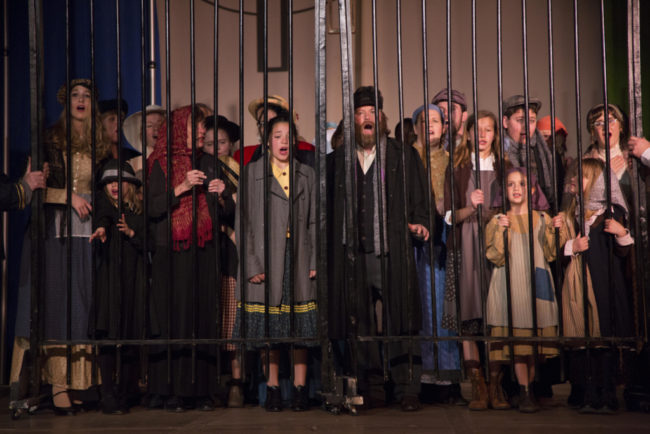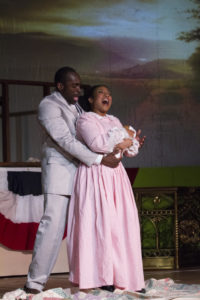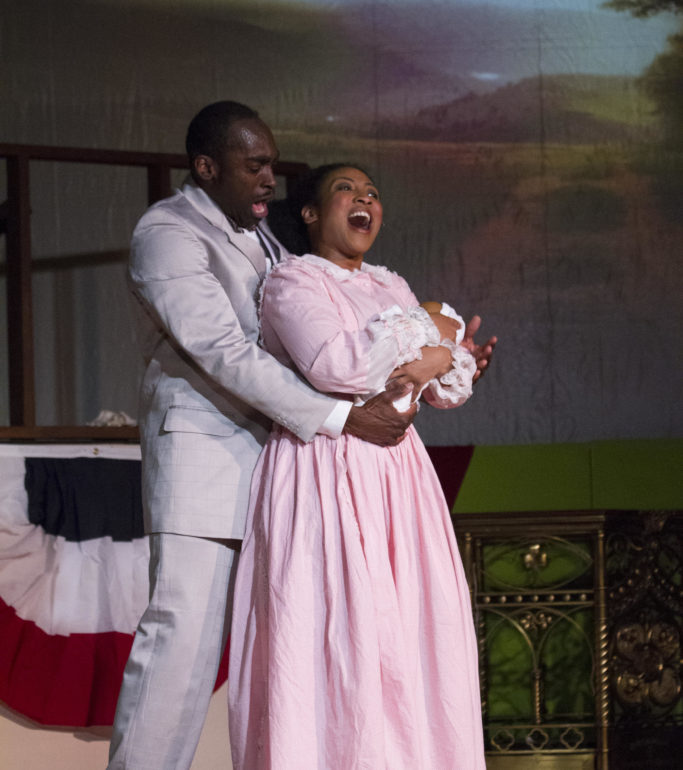Bringing the nation a new syncopation, the Memorial Players of Baltimore’s Bolton Hill neighborhood is revolutionizing community theatre as we know it here in Charm City. With their current production of Ahrens and Flaherty’s Ragtime, not only is the company putting on a show filled with spectacular talent and a poignant and powerfully relevant message but it’s providing this incredible experience to the public for free. Furthering the uniqueness of the company’s current production, they are serving the community one step further by giving whole families the opportunities a chance to perform together and spend quality time being involved in the production. In a TheatreBloom exclusive interview we sit down with area actors Samantha McEwen Deininger and Stephen Deininger to talk about their experience with Ragtime.
If you could give us a brief introduction, we’ll get started!

Stephen Deininger: I’m Stephen Deininger playing Tateh in Ragtime.
Samantha McEwen Deininger: I’m Samantha McEwen Deininger and I’m playing Sarah in Ragtime.
Stephen: For the umpteenth time between the both of us.
You guys do have a rich production history with Ragtime.
Stephen: On stage this is the third time I’ve played Tateh. I actually call it 3.5 because I understudied Tateh at Toby’s Dinner Theatre last fall but I never went in, so we’ll count that as half. The very first time I played Tateh was at Anne Arundel College about ten years ago and then more recently at Laurel Mill Playhouse, the understudy at Toby’s, and now here with Memorial Players.

Samantha: This is my third time as well doing the production. I was Sarah in the Laurel Mill production as well. I was also in the production at Toby’s, but not as Sarah, though I was understudying Sarah in addition to being in the ensemble and I actually did end up going on as Sarah in the run a few times. And now I’m also here with Memorial Players.
What is it about Ragtime that made you want to come back out for these roles again?
Stephen: Well, one of the things we were looking at was trying to find something to do with our children as a family all together. How many opportunities are we going to have to be on stage with our kids before they get too old? They’re kind of interested right now, but they may not be as they get older. My daughter is very interested right now but she’s also very young.
Samantha: That’s Eden, she’s nine.
Stephen: So she’s pretty much just getting introduced to theatre. She and my son, Stuart— who is now—
Samantha: He’s turning twelve.
Stephen: Sorry, I’m terrible with ages. I don’t even know how old I am. I have to do the math every time someone asks me. They both did a summer camp and got interested in doing theatre. So we said, “alright let’s see if we can do something as a family because we have some time now while they’re interested.” Originally they were going to both just be a part of the ensemble but the production ended up needing a Little Boy, so Stuart was promoted very quickly. But what a great way opportunity for us.
Being the mixed race family that we are, it’s kind of interesting by the end of the play— you have the white people, the immigrants, and the black people who come together as this mixed family, yet Samantha’s sitting there representing the black group, I’m sitting there representing the immigrant group, and my son is sitting there representing the white group— we’re all sitting there in this final picture, but from a different point of view.
So Stuart is Little Boy. And Eden?
Samantha: She’s an immigrant child.
Stephen: But not my immigrant child. She’s not Little Girl.
That’s really exciting that you guys get to work together on this project as a family. How has that been working out for you guys?
Samantha: It’s been kind of crazy. Intensely crazy, actually, because Stuart is still doing his dance rehearsals and he’s also in Assassins with Stephen.
Stephen: Yeah, there’s always a little boy in the ensemble of Assassins so he and I are doing that— just the two of us— right after this production at Laurel Mill Playhouse— I think he has been bitten by the bug. And I think he’s going to stick with it for a while.
Other than the awesome opportunity of getting to do this production with your family, how is this production of Ragtime different the third time around for you guys?
Stephen: Every production of Ragtime is really different and usually it’s the ensemble. They’re not hard roles to cast, they’re very clearly defined archetypes. Now I know some of them are hard to find, Tateh is usually a harder one to find. And then finding people who can Sarah or carry Coalhouse, that can be challenging. Now it’s funny because our Coalhouse, Corey Dunning, I saw him play Coalhouse a while ago at Liberty Showcase years and years and years ago. Now I don’t know how old Coalhouse was when the author conceived him, I think he’s supposed to be in his 30’s or something, I assume older than Sarah. But in that production Corey had only just achieved the “young adult” age whereas now he’s more like my age and playing the same character. From having seen him, he’s definitely grown and become a more complex human being in the time that’s passed since having seen him do it last. It’s really interesting saying “I saw you do this on stage and now I’m working with you on stage as you do this.”

A lot of people in this production have a history with the show. We came from something recent, especially with Sam being an active part of the Toby’s production, it’s fresh but it’s also a different perspective. Every person in that ensemble were leads in their own right. And then when we were in the Laurel Mill production together, we had a good solid ensemble. I started with Anne Arundel where we had some kids who were just starting out in the theatre. This cast is a really close-knit community. I get the feeling a lot of people know one another. It’s a much larger cast than what we’re used to working with but we’re trying to get to know everyone.
And there is just something about this particular location that’s really making the production stand out. When we walked into the place— this old stone church over in the Bolton Hill area— the week before tech, we walked in thinking “This doesn’t look like a theatre.” But we came back and suddenly they’ve built a stage over where the altar and the pulpit is. They’ve actually covered all the traditional church stuff with this humungous stage. This old church is being outfitted with temporary lighting and sound rigs, a full amazing pit orchestra— I mean we’re watching every element of this production be installed into this space and it’s really amazing.
Bill Kamberger directed this production, right? What’s it been like working with him?
Stephen: Yes. I’ve never worked with Bill before. He’s got a lot of really big ideas. The thing I like about it is that he’s using the church as a church. You know we have moments where we literally end up in a church. We have the funeral scene and things like that. We have these big beautiful oaken chairs that are just there and a part of the church and they’re being worked into the show. The way the stage is built out there’s a hole cut in it where the lectern actually is. So when you see Booker T. Washington making his big speeches, he ends up taking the podium right there at the lectern. These lofty morality speeches are coming at the audience from a church podium. Bill uses the space and what it is to tell the story.
Why does Ragtime have a personal hold on you guys?
Samantha: Me personally? “Your Daddy’s Son” was one of the first songs I ever worked on with my voice teacher. It kind of brought me out of my shell. I was very insecure and I shy; I didn’t want to perform. It’s true! My teacher used that number as a vehicle for me and he told me “this is going to be your song.” I started using it for competitions and to audition for shows. He’s recently passed away, my teacher, but the thought that I can still honor him— it’s just an extra personal thing with meaning for me to get to sing that song this time.
Is there a personal tie for you, Stephen? Maybe an immigrant tie-in?
Stephen: No, no immigrant tie-in, though I do enjoy growing in a full beard. It’s funny, every time I approach Tateh, I realize he’s a character that I miss when I’m not in his skin. There’s so many points in my life where I can look at where I was and where Tateh was and relate. I remember having these moments where my son, who is now with me on stage, you know when he was a baby I was leaving the army and I had no job lined up, and I had a deadline. I remember how angry I was, struggling to try and find a job, and I have these moments. But then I have moments were I realize “oh, everything totally worked out.” And there’s a joy in those times. I think it’s a very easy character fit for me both as a father and as a man who struggled to find himself for a while.
Do you have a moment in the show that really defines Ragtime for you?
Stephen: I think the last image that you get.
Samantha: Yeah I was going to say the same thing.
Stephen: It reflects our family in a way and some of it is literally our family. I think that final scene is what the author was getting at. It’s one of those things where we’re not there yet so that’s why we’re still doing this play over and over. I think that for the folks at Memorial who have done shows there over and over, their impetus for this particular show was remembering being stuck at a rehearsal and not knowing how to get home with the Baltimore riots were breaking out. That’s something that I know I spoke about when we interviewed for the Godspell production that I directed last year. That was a big part of it. It’s a common theme and I think it’s what we’re dealing with in this area. We don’t all know how to live together as a people yet. Some of us do and some of us don’t, but it’s where we’re ultimately headed. Sometimes you have to stop and say “we know where we’re headed as a country or as a people or as a tribe” or however you want to phrase it.
What has being able to bring your family together as a part of this powerful show meant to you guys?

Samantha: It has definitely opened up a lot more conversations, especially with our oldest, Stuart, we’ve had a lot more conversations about race and inequality and things that they just haven’t seen a lot of, to be frank, at their age. I think this is helping them get a much better picture of things in addition to just learning it as a part of black history month. They’re learning it because it’s what they’re supposed to learn in school, but now they get to see it first hand with the play. It’s opened up a lot of dialogue for us. It’s been a good learning tool.
Stephen: The kids are in a very diverse school. I remember early on when my son was in first or second grade, I saw him leaving one day and he said “Bye, Muhammad,” to another student. And it was just natural to him. As natural as it was when I was a kid to say “See ya, John” or “See ya, Bill.” I think that our future generation is probably a little further along than we all are when it comes to the themes of this play. But I think it’s been cool personally to watch our children develop.
I can’t think of a better thing to teach kids about how they need to be as adults than to get them involved with an art form like theatre. There are some art forms, like painting, where you get your paint, you get your material, and you make what you want to make. With theatre you have to have two things. You have to come to rehearsal with your stuff ready. You have to be personally responsible, like the way an adult has to be personally responsible. And you also have to work as a team. You have to negotiate and you have to deal with a lot of coordination and teamwork skills. Like our stage that’s been built up there, it doesn’t just pop up. People had to work together like a barn-raising to get that thing going.
I’m kind of crazy about being off book. I’m very strict with myself. I feel like I’m wasting time if I have a book in my hand because no one walks around in real life reading what they’re going to say out of the book in their hand. So I get that out of the way as quickly as possible. The other day I watched my son, and I guess he’s watched me do this over the years, but at rehearsal for Assassins, he read his lines right there, memorized them, and just did it. He’s adopted that “I don’t want my book in my hand” mentality, he’s going to be responsible for himself. I was just sitting there laughing, thinking “go for it!”
Now does Eden follow you in that regard, Sam?
Samantha: A little bit. For this show, she’s said she never saw me with a script in my hand and I had to say it’s because I’ve done it a million times. And of course she only has like four lines, but they’re four lines she had to memorize. But she got them pretty quick. Eden in her own right is trying to come out a little bit as an actress. She’s actually quite good but she’s not quite— what do you call it— she doesn’t exactly have the focus yet, but she’s still finding herself. And she’s got plenty of time for that.
Stephen: She’s a graphic artist. She’s taken up painting. She’s made several paintings for that school fundraiser, we got a way bigger response from that than we anticipated.
Samantha: But she’s having a good time with the theatre stuff.
How is Eden handling what happens with your character, Sam?
Stephen: It’s funny that you say that. Going way back to when we did it at Laurel Mill, she was what? About five? She just about had a meltdown when Sam got killed on stage. She about lost her mind. And then we saw it at Toby’s and she just about lost her mind again. And when we brought her to the first rehearsal she said, “This makes me sad.” Now she’ s like “Okay, it’s Tuesday. Move along.”
Samantha: She’s so over it.
Stephen: Yeah, “When do I go on?”
Samantha: I have tried to shield her from the coffin scene, though. I think that’s a bit much for her.
What has being involved with this show taught you guys about yourselves as performers, as parents, as a married couple, or just in general?
Stephen: Good question. I think with the show, and maybe not with this production because we’ve meditated on these characters already, but being a father and being a man who has to work hard and push himself to go further and further, it really is a reflection on where you’ve been and how far you’ve come. We always like to sit there with the present-day us and say, “I want more.” But it’s also important to remember how far you’ve come and every now then to just be happy with what you’ve got. That’s a nice feeling. There’s also a message in this play that is so eternal and so relevant. I remember when I first did it felt relevant but for different reasons. And then ten years later it felt relevant but for newer, fresher reasons. And when they did it at Toby’s it was right after the Baltimore riots so there a lot of things that were very fresh there too.
That’s the part of it that stays fresh. There aren’t necessarily a lot of people who are connecting with the “coming over on a boat” part of the story, we don’t do that so much anymore, then again with the current refugee crisis, well maybe it’s all fresh. The way that society handles people who are different and how we need to come together? I don’t think those are issues that are going away anytime soon so this play is never going to fall out of relevance. It’s not going to be like No, No, Nanette or something like that, it’s going to stay relevant.
Samantha: I remember having an interesting thought recently. My sister has a son who is going to be turning two in July. He’s mixed. I thought it was cute, because we were all hanging out with him at one point and here he has his white dad and his black mom, and then he’s got us hanging out with him, his cousins are all different races, his grandparents are all different races, and it just made me think what a cute little blend it is. I don’t think he even notices that there is anything different, and I don’t think he ever would. How cool that is that you can see that that is where the world is going. Going back to that end shot of Ragtime, we’re raising up these children to be colorblind and be around people who love them and who surround them with love, and that is absolutely beautiful and I love that.
Why should people come and see Ragtime?
Stephen: I think that there are people that very much care about the message of the story. I think that you’re going to find with this group is that they put on these shows for free for a reason and it’s because they have a message. They may not do as much theater as we do or as some of our friends do, but they have a message, they have something to say, and they know they have an audience they need to speak to who wants to meditate on the message.
I’m going to go back to that last image again. If a production of Ragtime works, the most important character on the stage is Little Coalhouse at the very, very end. When that child runs out— from an actor’s standpoint we get so caught up in our ego and our performance, you know “look at me! I can do it too!” we get so wrapped up in all that— but all that kid has to do is run across the stage and give somebody a hug. And the audience goes nuts. If the show has worked then people completely lose their minds. As a performer of course you think “man, I’m working so hard and here’s this kid and just like that the show belongs to this kid.” But that’s the point. It’s beautiful acceptance of how things should have been all along. It drives the whole thing home. And we have this kid named Sky and she’s just so excited, she’s going to break hearts. There’s just so much hope for the future in that moment. I always use that to measure how well the entire production has done, is how well that moment touches the audience.
I’d say if you come to the show— first off, you don’t have to pay to get in, free theatre— but you’ll be able to meditate on some very important topics that are relevant. And then there’s the ending. If you’re not moved by that— wow. You’ll have a moment.
Samantha: This production is very much a community theatre production in the sense that the set was built by the actors and stage hands and directors. All the costumes are all put together by the actors. Everything you see has been put together by everybody involved. It’s very much a community group. You’re going to see all heart, all sweat, and all tears all brought on by this very passionate group. It’s just amazing.
Ragtime plays through April 24, 2016 at Memorial Players housed in the Memorial Episcopal Church— 1407 Bolton Street in the Bolton Hill neighborhood of Baltimore, MD. This is a free performance for all who wish to attend and audiences are seated on a first come, first seated basis.
Click here to read Ashley Gerhardt’s review of Ragtime.

